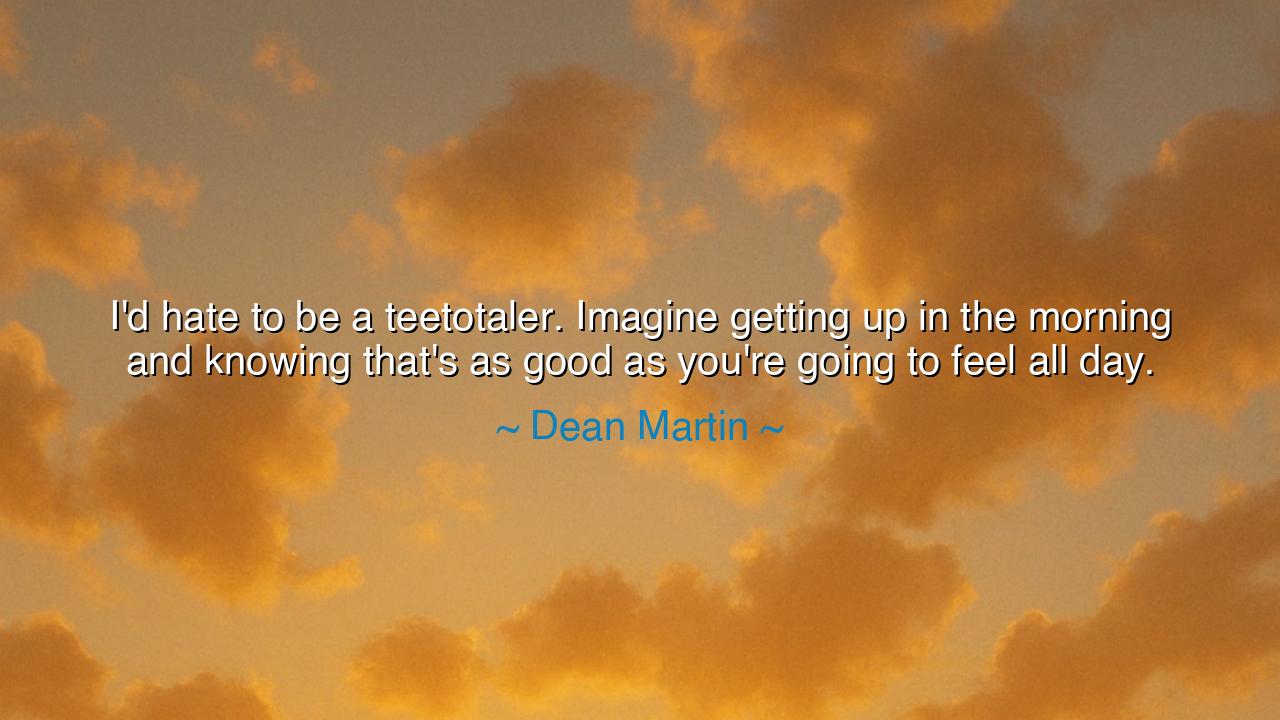
I'd hate to be a teetotaler. Imagine getting up in the morning
I'd hate to be a teetotaler. Imagine getting up in the morning and knowing that's as good as you're going to feel all day.






When Dean Martin quipped, “I’d hate to be a teetotaler. Imagine getting up in the morning and knowing that’s as good as you’re going to feel all day,” he wrapped wit around a deeper truth about human longing and the pursuit of joy. On the surface, his words sparkle with humor, a jest from a man known for his charm, his voice, and his glass in hand. Yet beneath the laughter lies a reflection on how men seek relief from the burdens of existence, how they search for ways to make the day lighter, and how humor itself can soften the hard edges of life.
The origin of this quote lies in Martin’s public persona, built during his years in the Rat Pack alongside Frank Sinatra and Sammy Davis Jr. He crafted the image of the ever-relaxed crooner, drink in hand, exuding ease and merriment. While much of his “drunken” persona was an act, it was a mirror of a universal truth: men have always sought a way to escape the full weight of their cares, whether in wine, in music, or in fellowship. His jest about the teetotaler is not simply mockery of abstinence, but a playful exaltation of the idea that life must contain pleasure, that one must sometimes taste sweetness to endure its bitterness.
The ancients themselves understood this longing. Consider Dionysus, the Greek god of wine, whose festivals were not mere indulgence but sacred rites. The Greeks saw in wine not only intoxication but release, a breaking down of barriers, a glimpse of freedom from the chains of worry and toil. Martin’s quip carries the echo of this same spirit: that to go through life without reprieve, to feel only the flatness of the morning’s first clarity, might seem a kind of poverty of the soul.
Yet history also reminds us of the balance that must be kept. Winston Churchill, famed for his wit and his fondness for drink, once said, “I have taken more out of alcohol than alcohol has taken out of me.” In his cups, he found courage and camaraderie, yet he never let it dull his will to lead a nation through its darkest hour. Like Dean Martin, Churchill used humor and indulgence as weapons against despair. But unlike those consumed by it, he wielded it with purpose. The danger, of course, is that pleasure, unchecked, may turn from a servant into a master.
Martin’s joke also shines a light on the human need for elevation. To wake and know the day can offer no higher joy than its first hour is to risk despair. The heart longs for something more—whether through wine, music, laughter, or love. His jest, though playful, is a challenge: find your own way to make each day rise beyond its beginning. If not through drink, then through art, friendship, or the pursuit of wonder. For man was not made to live flat lives, but to be lifted, to feel his soul stirred, to greet even the evening with joy.
The lesson is thus twofold: do not deny yourself the pleasures that make life bearable, but also do not let them consume the very soul they are meant to refresh. Seek merriment as a means of renewal, not as a mask for despair. If you drink, drink with measure; if you laugh, laugh heartily; if you sing, sing with abandon. Let each day contain some spark greater than the morning’s first light, so that life is not endured, but celebrated.
Practically, this means we must each find our own “wine,” whether literal or symbolic. It may be the joy of music, the beauty of art, the comfort of friendship, or the thrill of creation. Whatever it is, let it raise you above the common weight of life, so that each day is not a dull march but a song. For in the end, Martin’s words remind us that the true tragedy is not abstaining from drink, but abstaining from joy.
Thus, his jest becomes a teaching: that men must not settle for a life that never rises above its first note. Whether through humor, companionship, or the arts of celebration, seek always to make the day richer than its dawn. For the heart that knows how to lift itself will never despair, and the soul that finds joy will always outlast the shadows.






AAdministratorAdministrator
Welcome, honored guests. Please leave a comment, we will respond soon